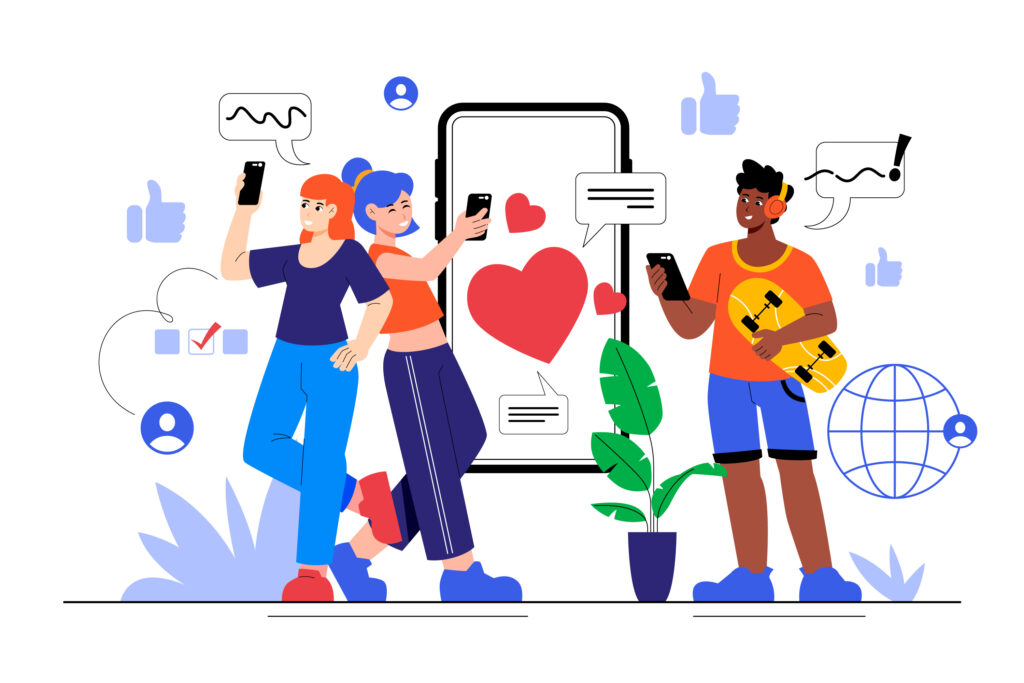In today’s fast-paced digital age, social media has emerged as one of the most influential platforms for communication, marketing, and networking. What began as a simple way to connect with friends and family has now evolved into a powerful tool that shapes public opinion, drives global conversations, and fuels business growth. With billions of users worldwide on platforms such as Facebook, Instagram, Twitter (X), LinkedIn, and YouTube, social media has become a central hub for information sharing, brand interaction, and consumer engagement.
For individuals, social media offers a platform to express opinions, showcase creativity, and build personal brands. For businesses, it provides a cost-effective means to promote products, connect with customers, gather feedback, and stay ahead of market trends. Real-time communication and data analytics allow companies to understand their audiences better and tailor their strategies accordingly. Social media also plays a crucial role in raising awareness about social issues, driving campaigns, and connecting people across borders.
As the digital landscape continues to evolve, the importance of social media is only growing. It is no longer optional but essential for anyone—whether an individual or an organization—looking to thrive in the digital world.
In today’s fast-paced and interconnected world, social media plays a crucial role in shaping communication, marketing, education, and global awareness. What began as platforms for sharing personal updates and photos has now evolved into powerful digital tools that impact every aspect of life—from how we interact with others to how we build businesses and stay informed. With billions of users across platforms like Facebook, Instagram, Twitter (X), LinkedIn, YouTube, and TikTok, the influence of social media continues to grow rapidly.

1. Instant Communication and Global Connectivity
Social media has redefined the way people communicate. It enables instant interaction across the globe, bridging geographical distances and allowing people to stay connected regardless of location. Whether it’s chatting with family members overseas, participating in online communities, or collaborating with international teams, social media breaks down barriers and makes the world feel smaller and more accessible.
From messaging and video calls to live broadcasting and real-time commenting, platforms offer numerous ways for individuals and groups to communicate. This has not only enhanced personal relationships but also empowered communities to organize and engage in collective discussions, campaigns, and support systems.
2. Business Growth and Digital Marketing Opportunities
One of the most significant benefits of social media is its impact on business. Whether it’s a small startup or a global corporation, businesses now rely heavily on social media platforms to build brand identity, connect with customers, and drive sales. Through targeted advertising, influencer partnerships, and engaging content, companies can reach potential customers more efficiently than through traditional media.
Social media marketing offers cost-effective strategies with measurable results. With tools like Facebook Ads Manager and Instagram Insights, businesses can track performance, engagement rates, conversions, and audience demographics in real-time. This data-driven approach allows for continuous improvement and better ROI.
Additionally, platforms like Instagram and Pinterest support visual storytelling, while LinkedIn helps B2B businesses connect with professionals and establish authority in their industry. The ability to humanize a brand through storytelling and engagement is one of the key strengths of social media marketing.
3. Real-Time Access to News and Information
Social media has revolutionized how we consume news and information. Traditional media outlets are no longer the only sources of breaking news. Social media platforms offer instant updates on global events, politics, entertainment, weather, and more. Users can follow hashtags, join discussions, and watch live streams of events as they happen.
This immediacy keeps people informed, but it also comes with responsibility. Not all content on social media is accurate, and the spread of misinformation is a growing concern. Therefore, users must develop digital literacy skills and verify information from credible sources before accepting it as true.
4. Education and Learning Resources
Social media serves as a valuable educational resource. Platforms like YouTube, LinkedIn Learning, and even Instagram offer tutorials, webinars, infographics, and online courses covering a vast range of subjects. Educators, professionals, and content creators use these platforms to share knowledge and foster learning communities.
Students and professionals alike benefit from educational content that is engaging, visual, and accessible from anywhere. Teachers also use social media to communicate with students, share assignments, and encourage interactive learning. This flexibility makes education more inclusive and tailored to individual learning styles.
5. Career Development and Networking
Professional networking has found a new home on social media, especially on platforms like LinkedIn. It allows users to build professional profiles, showcase skills and achievements, apply for jobs, and connect with industry experts. Recruiters actively use social media to discover talent, while professionals use it to stay informed about job opportunities, market trends, and thought leadership.
Networking has never been more convenient. Webinars, virtual conferences, and online groups have replaced many traditional networking events, providing more flexible options for personal and career growth.
6. Raising Awareness and Driving Social Change
Social media plays a vital role in promoting social causes and driving change. It provides a voice to marginalized communities and helps spread awareness about critical issues such as gender equality, environmental protection, mental health, and human rights. Campaigns like #MeToo, #BlackLivesMatter, and #ClimateAction gained massive momentum through social media, mobilizing millions around the globe.
Users can share personal stories, support campaigns, and engage with global movements, making it a powerful tool for activism. Influencers and NGOs also use social platforms to educate and inspire action among followers.
7. Entertainment and Creative Expression
Beyond communication and information, social media is a hub of creativity and entertainment. Users can watch funny videos, listen to music, play games, and explore content across countless genres. Platforms like TikTok and Instagram Reels encourage users to create and share their own content, often leading to viral trends and internet fame.
For artists, musicians, writers, and performers, social media provides a stage to showcase talent and reach audiences without needing traditional media exposure. It democratizes content creation and allows anyone with a smartphone to
